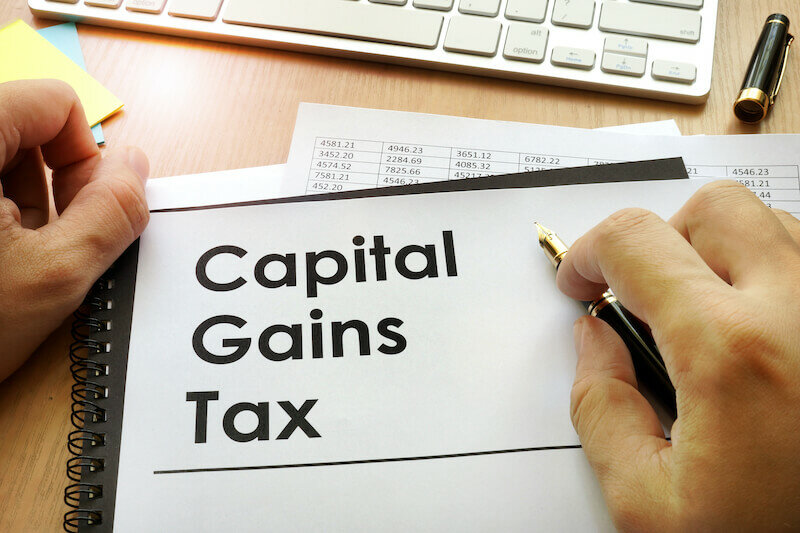If you’re selling your house in Texas, a common concern is that taxes may reduce the profit made on the selling price of your home. Texas does not have a state tax on income. This doesn’t mean that homes sold in Texas are tax-free because the federal capital gains tax can be costly.
Luckily, there are steps you can take when selling a home or property in Texas to avoid the capital gains tax.
I’ve compiled several helpful tips to help you reduce or avoid the costly capital gains tax on your real estate purchases to help you get the most for your property.

Capital Gains Tax in Texas
Capital gains taxes are taxes paid on the sale of an investment asset, like stocks or houses. In most states, the capital gains tax is based on the state’s income tax. Since Texas doesn’t have an income tax, the federal government instead sets a taxation amount for the capital gains tax on a home you’re selling in Texas.
Capital gain is divided into two categories: short-term and long-term. If you’ve owned the property you’re selling for less than a year, the profit made from the sale is considered a short-term capital gain. If you’ve owned the property for over a year, the profit from the sale is considered a long-term capital gain.
Short-term capital gains are taxed more heavily than long-term capital gains. This means that when selling a house in Texas, you’re more likely to reduce or eliminate the owed capital gains tax if you’ve owned the home for more than a year.
The most that you can be required to pay in capital gains tax on a home in Texas is 20 percent of the sale value, which can be incredibly expensive and detrimental if you’re selling a high-value home. However, a personal residence exemption can help you reduce or eliminate the amount you will have to pay in capital gains tax when you sell your home in Texas.
Capital Gains Tax in Dallas
In Dallas, the capital gains tax on homes is usually around 15%. While this is slightly lower than the rest of the state, it can still be a costly deduction. The rate for the capital gains tax in Dallas is usually under 15% for home sales that fall in the long-term capital gains category, but that tax rate can still be reduced with a personal residence exemption.
In Dallas, you must own your home for a year before selling it. Owning your home for a year before selling does not ensure that your home qualifies for the personal residence exemption. Selling it will still count as a long-term capital gain and be subject to a reduced tax rate.
Even if you’ve lived in the home for over a year, you need to factor in the cost of any home improvement potential buyers will request. If you’re ready to sell your home and don’t want to deal with repairs, we buy houses in Dallas for singles, couples, and families who want to unload fast. Expect a fair price with no additional home improvement necessary.
Personal Residence Exemption
A personal residence exemption is the easiest and most commonly used method of avoiding or reducing the capital gains tax on your home in Texas. This method varies on your filing status.
A personal residence exemption allows you to exclude $250,000 of the profit made from selling your home from your income if you file your tax return as a single or head of household. If you file taxes jointly, a personal residence exemption allows you to exclude $500,000 of profit from the sale of your home from your taxable income.
If you’re looking to utilize a personal residence exemption to reduce the amount of capital gains tax that you will owe on your property, there are three requirements that your home must meet.
The first requirement that you must meet to receive a personal residence exemption is that you must have owned your home for a total of no less than two years in the five years before you try to sell.
The second requirement is that you must have used the home you’re selling as your primary residence for at least two years in that same period. That means this exemption doesn’t apply to a secondary home or rental property.
The third and final requirement is that you haven’t received a personal residence exemption on another home in the past two years. If you own an investment property, you are not able to qualify for an exemption.
If you meet all three of those requirements, you’re eligible for a personal residence exemption. This means that you will not have to pay the capital gains tax on your property. This can save you up to $250,000 in federal taxes on the home you’re selling.
The requirements for personal residence exemptions are designed to help those who did not purchase their home with the intent of flipping or renting it for money and hinder those who did.
However, as long as you meet the requirements for the personal residence exemption, there is a good chance that you will either significantly reduce or eliminate the amount of capital gains tax you have to pay on your home. If you’re strapped for cash and need to make the sale fast, consider working with cash home buyers in Texas.

Net Capital Gains
When talking about the capital gains tax rate in Texas, it’s important to be able to define what net capital gains are. Net capital gains are the amount you’ve earned from selling capital assets like your home, and accounts for both long-term and short-term capital gains. Net capital gains also consider any money you’ve spent or lost on capital assets including closing costs, and both short-term and long-term losses can affect your net capital gain regardless of the market value of your home.
If you’ve made more money from selling your long-term capital assets than you have lost in short-term capital losses, then you are considered to have made a net capital gain. The amount of net capital gain you make selling your home can is an important factor in determining the amount you will owe in capital gains tax. This is influenced by a variety of factors, including the sale price of the property, the tax bracket you are in, and the purchase price of the property.
It’s important to note that even if your home or property does not qualify for a personal residence exemption, you still may not have to pay the 15-20 percent tax on your net capital gains. If you file your taxes as a single-filer, and your annual taxable income is less than $40,400 your net capital gains may not be taxed. Similarly, married couples or other homeowners whose joint taxable income is under $80,800 may not be taxed on some or all of their net capital gains.
Conclusion
Home buying and the process of looking for a new home can be difficult. It takes a little more than posting an ad that says “buy my house in Arlington.” When you’re looking to sell your home in Texas, the capital gains tax can be an unexpected expense. With a tax rate ranging anywhere from nothing up to 20 percent, selling your property can be a daunting task, especially if you have a net capital gain for this tax year.
If the home you’re selling qualifies for a personal residence exemption, you could reduce or eliminate the amount of capital gains tax you owe on the profits from selling your home in Texas. Additionally, if your income meets the requirements set by the IRS you may not have to pay any taxes on your net capital gains from selling your home.
Even if your home does not qualify for a personal residence exemption for the capital gains tax, you can still reduce the amount you owe. You can reduce the amount you owe for the capital gains tax in Texas if you’ve owned the home for over a year, as long-term capital gains are taxed less severely than short-term capital gains.
Even though there are other ways to reduce the amount you will owe in capital gains tax from the sale of your home in Texas, waiting until your home meets the requirements for a personal residence exemption may be beneficial.
As a disclaimer, this is not comprehensive legal advice about property tax laws in TX. The tax code is complicated, especially when it comes to real estate taxes and tax liability. It’s a good idea to speak to a qualified tax professional or realtor about what property tax exemptions you qualify for and how to claim them.
